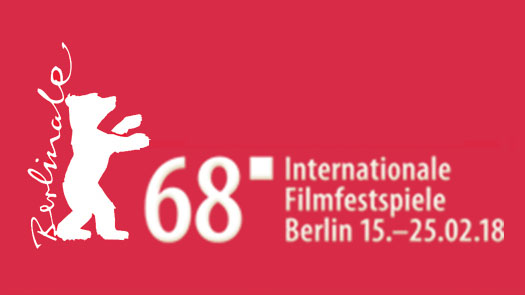Mein Bruder heißt Robert und ist ein Idiot (My Brother’s Name is Robert and He Is an Idiot): An interview with director Philip Gröning
It was obvious from the moment that the end credits rolled at the press screening for Philip Gröning’s Mein Bruder heißt Robert und ist ein Idiot that the film was going to be divisive. There was a fair amount of applause, but there were also a number of emphatic boos – which is almost unheard of at the Berlin International Film Festival. The movie certainly won’t be everyone’s cup of tea, and since it’s a three-hour piece that ponders the meaning and nature of time, this is a logical conclusion. Alternating between muted and self-assertive, the film depicts several days in the lives of mutually dependent twins Robert (Josef Mattes) and Elena (Julia Zange) as adulthood looms and the outside world intrudes on their symbiotic existence, with dark results. We sat down with the film’s director at this year’s Berlin International Film Festival.
This is a film that deals with time. It’s also a film with a significant running time, and it spent a rather long time in production. You shot it back in 2013? Is this elongated time in editing part of your methodology?
The first part, yes. The second part was shot in the summer of 2014. It’s not very much of a methodology. When we had finished shooting I was pretty exhausted and we edited one version, and it always takes me a long time to edit a film. One has to know, when I edited Into Great Silence I edited for two and a half years, and with The Police Officer’s Wife the same, and here it became a little longer. It took three and a half years, which is too long. I think the reason is that this film is finding the balance between a philosophical discussion and the very sensual relationship between the siblings. And the twist towards quite an aggressive type of storytelling at the end – that’s very complicated, finding the balance between how often do you see what’s in nature, and what do you hear and when. In order not to fall flat and illustrate the theories, but to give a space for the viewer, it was super, super complicated.
Did you learn anything new about time when you made this movie?
I learned that sound is forming our perception of time immensely, and I wasn’t quite aware of that before. We shot under those wind turbine things and the rhythm of those wind crafts was actually shaping our time very much. And, then, I became more and more aware of the fact that when you look at a film – the memory of the film that you have is not time-based anymore. It sounds strange, but you look at a film for three hours and it forms an object in your consciousness that is a simultaneous object. In this case, in this film, this is what the disturbing thing is: it’s two objects. You have the one object in the first part of the film when everything is calm and in harmony, and you have the second object, which is the violence. You as the viewer – it will keep you busy for a couple of days to get those two objects together. I was trying to do a film where I am also getting to the limit of what cinema is, and this is a very disturbing thing, to put two objects into the viewer’s mind and to leave the riddle of how they are connected up to the viewer.
The dialogue is very poetic and lyrical. Granted, the twins quote a number of philosophers, but was there any room for improvisation when they had to talk as their characters?
There was no space for improvisation at all. As far as the words, those were completely fixed. It’s the same in The Police Officer’s Wife, although we shot without a script, of course in the scene where they talk with the small girl, that was improvised, but with the adults when they talk amongst themselves, they were completely written scenes. Some of our scenes were written just before the shoot. When Robert talks about duration, when they had already captured their prisoner, that scene was given to him about ten minutes before shooting. It helped him develop that quality of pondering and thinking, because he was trying to remember the text that he only could look at for ten minutes. But the dialogue was completely written.
How do you approach a new potential project as a filmmaker?
My basic approach is always the same. I find a theme or a field in which I want to work, and then I’m trying to find a form that will transport that very theme, that reality to the viewer – not in the sense that the viewer looks at it, but that the viewer becomes sort of infected by it. More like I’m planting a virus than telling a story. This story was about a reflection of time in which language would be the prime element. At the same time I realised, and this is something I learned from Into Great Silence, the way you have to look at nature is a very complicated process if you want to create images of nature that are more than just picture postcards. So that’s something I learned from Into Great Silence that I tried to transport to this film.
Oliver Johnston
Mein Bruder heißt Robert und ist ein Idiot (My Brother’s Name is Robert and He Is an Idiot) does not have a UK release date yet. Read our review here.
Read more reviews from our Berlin Film Festival 2018 coverage here.
For further information about the event visit the Berlin Film Festival website here.

























Facebook
Twitter
Instagram
YouTube
RSS